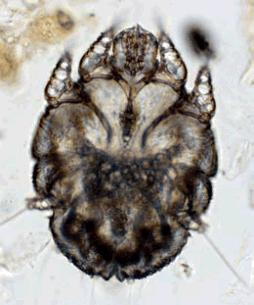Sarcoptic Mange in Dogs
- posted: Apr. 21, 2015

The Ins and Outs of Canine Mange
Warm weather is finally here! As we spend more time outdoors with our pets, there are more chances for our furry friends to contact dogs and wildlife. This, in turn, can lead to contact with parasites like fleas, ticks and mange mites.
There are several types of mites that can cause problems in dogs, but the one that we typically think of when we see a “mangy” dog is caused by a specific mite known as the sarcoptic mange mite, Sarcoptes scabei. Mites are not insects but are 8 legged critters more closely related to spiders and ticks. The little round sarcoptic mites cause problems by burrowing under the skin. The sensation of the mites crawling around and their eggs laid under the skin cause an allergic reaction leading to hair loss, bright red skin and intense itching. Sarcoptic mange most commonly affects the elbows, belly and ears. I bet some of you are itchy just thinking about those creepy-crawly mites!
Sarcoptic mange is highly contagious to other dogs and may occasionally affect people, though, thankfully, the mites do not live long in our skin. Cats are not typically affected. Mange is diagnosed by a test called a skin scraping—skin is scraped with a scalpel and the material is examined under the microscope to look for mites. Mange mites may be difficult to find in some cases, so, if mange is highly suspected but no mites are found, we may still treat for sarcoptic mange as a precaution.
Sarcoptic mites are spread by direct contact with other infected animals. Other dogs or fox seem to be the most likely carriers in York County. If a dog has mange, all other dogs in the household should be treated as a precaution. Mange can be treated with several types of medications such as ivermectin, Revolution, and medicated dips. It is also recommended to wash or replace bedding, collars and harnesses belonging to infected dogs. Dogs may also need antibiotics to control secondary bacterial infections and medications or shampoos to control itching until the mites are gone.
Sarcoptic mange is not very common, but we do see occasional cases and it can cause extreme itching and discomfort. While lots of other things can cause itchy skin, have your dog checked if he or she has symptoms of mange so proper treatment can begin!
Photo taken from www.veterinarypartner.com
This blog brought to you by the Patton Veterinary Hospital serving Red Lion, York and the surrounding areas.
Location
Patton Veterinary Hospital
425 E Broadway
Red Lion, PA 17356
